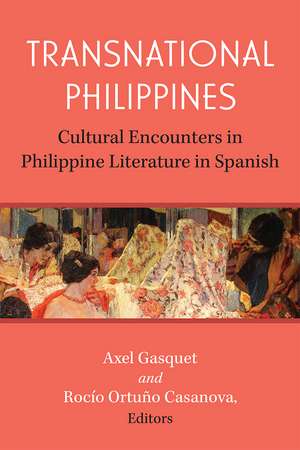Transnational Philippines: Cultural Encounters in Philippine Literature in Spanish
Editat de Rocío Ortuño Casanova, Axel Gasqueten Limba Engleză Paperback – 27 feb 2024
Yet Transnational Philippines also questions the constraints of traditional literary genres in order to make room for Philippine texts and other colonial and postcolonial texts, so that those texts can be taken into consideration in literary studies. Its chapters elaborate on the problems surrounding the cultural and identity relations of the Philippines with other regions and the literary nature of Philippine texts. By addressing the need for a postnational approach to Spanish-language Philippine literature, the book challenges the Spain/Latin America dichotomy existing in Spanish language literary studies and leans toward a global conception of the Hispanophone.
| Toate formatele și edițiile | Preț | Express |
|---|---|---|
| Paperback (1) | 201.03 lei 3-5 săpt. | |
| UNIVERSITY OF MICHIGAN PRESS – 27 feb 2024 | 201.03 lei 3-5 săpt. | |
| Hardback (1) | 501.82 lei 3-5 săpt. | |
| UNIVERSITY OF MICHIGAN PRESS – 27 feb 2024 | 501.82 lei 3-5 săpt. |
Preț: 201.03 lei
Nou
Puncte Express: 302
Preț estimativ în valută:
38.47€ • 40.45$ • 31.79£
38.47€ • 40.45$ • 31.79£
Carte disponibilă
Livrare economică 27 martie-10 aprilie
Preluare comenzi: 021 569.72.76
Specificații
ISBN-13: 9780472039616
ISBN-10: 047203961X
Pagini: 302
Ilustrații: 3 figures
Dimensiuni: 152 x 229 x 20 mm
Greutate: 0.4 kg
Editura: UNIVERSITY OF MICHIGAN PRESS
Colecția University of Michigan Press
ISBN-10: 047203961X
Pagini: 302
Ilustrații: 3 figures
Dimensiuni: 152 x 229 x 20 mm
Greutate: 0.4 kg
Editura: UNIVERSITY OF MICHIGAN PRESS
Colecția University of Michigan Press
Notă biografică
Axel Gasquet is Professor of Spanish American literature and Civilization at the University Clermont Auvergne (France) and chief researcher of CNRS.
Rocío Ortuño Casanova is Associate Professor at the UNED (Universidad Nacional de Educación a Distancia) and is affiliated to the University of Antwerp.
Rocío Ortuño Casanova is Associate Professor at the UNED (Universidad Nacional de Educación a Distancia) and is affiliated to the University of Antwerp.
Recenzii
“Transnational Philippines is a much-needed contribution to the subfield of Spanish-language Filipino literature and culture. This is an emerging subfield and a book like this represents a major contribution toward solidifying it and toward encouraging the teaching of Spanish-language Filipino literature in college courses.”
“Transnational Philippines performs a valuable work of recovery and reinterpretation for, and on behalf of, Philippine, Spanish, Hispanophone, and world literature. Traversing continents and oceans, languages and cultures, and political borders and identities, this wide-ranging volume makes a compelling argument for the creativity, intellectual fecundity and variety, and theoretical importance of thinking and writing from the margins.”
“Transnational Philippines performs a valuable work of recovery and reinterpretation for, and on behalf of, Philippine, Spanish, Hispanophone, and world literature. Traversing continents and oceans, languages and cultures, and political borders and identities, this wide-ranging volume makes a compelling argument for the creativity, intellectual fecundity and variety, and theoretical importance of thinking and writing from the margins.”
Descriere
A study of Philippine literary production that attempts to break the nation’s isolation from broader Spanish literature
